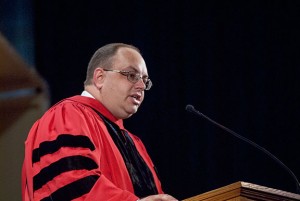“Why does Presbyterian College exist?” Provost asks
 The 2013-2014 academic year at Presbyterian College formally began Tuesday, September 3, with Opening Convocation in Belk Auditorium.
The 2013-2014 academic year at Presbyterian College formally began Tuesday, September 3, with Opening Convocation in Belk Auditorium.
Dr. Donald R. Raber II, PC’s Provost, gave an inspiring convocation address as he inquired: “Why does Presbyterian College exist?”
Raber, who earned a Ph.D. in political science from Harvard in 2001, posed the question to his freshman seminar class at the beginning of the semester.
“Their responses were outstanding,” Raber said, “and what stood out to me was how integrated they were with a sense of mission – a purpose for why they were here and what PC could offer them as they continued along life’s journey.”
The students, according to Raber, said that PC “exists as a family, or a community, that offers opportunities to build human connections, to develop loving, caring relationships, and to prepare students to act as persons of honor, integrity, and excellence in whatever life holds for them – both while they are here and after they receive their diplomas.”
Raber insisted that anyone associated with PC probably shares similar sentiments as his students, whether they’re new students at PC School of Pharmacy, undergraduate seniors, faculty or staff members, or alumni. People’s feelings about PC are similar because the College’s mission has remained steadfast over the years.
Raber stated the College’s mission: “Our compelling purpose, as a church-related liberal arts college, is to develop, within the framework of Christian faith, the mental, physical, moral, and spiritual capacities of each student in preparation for a lifetime of personal and vocational fulfillment and responsible contribution to our democratic society and the world community.”
“While the language may change from generation to generation,” Raber said, “the beliefs and values embodied in those words have shaped Presbyterian College since its founding in 1880 and will continue to answer the question I posed earlier: ‘Why does Presbyterian College exist?’”
Raber cautioned that “refocusing our mission becomes absolutely essential” when considering factors such as cost and accessibility of a college education, technology, and the economy. He went on to show how the mission has remained the same, although the curriculum, tuition, size and makeup of the student body, and even buildings may have changed over the years.
“Listen to this statement from our first catalog: ‘The need of the South is a work-day education, that will fit our youth of average mental ability for lives of usefulness and honor,’” Raber said.
The 1913 academic catalog, further, stated that the “broadest aim” of PC was to “to prepare the students who pass through its halls to live lives of the highest usefulness,” according to Raber.
And even 50 years ago, PC’s academic catalog stated that the College’s “liberal arts program, designed to develop the full capacity of each student, reaches maximum effectiveness through the system of small classes and close individual attention.”
“Development. Growth. Honor. Responsibility. Usefulness. Preparation,” Raber said. “All these concepts are reflected in the missions outlined by the College from 1880 to today.”
While he believes that the language of the College’s mission will change over the years, Raber believes the mission itself will remain the same.
“We can and will maintain our commitments to preparing students for whatever comes their way,” Raber said, “while making clear what it is that we can do to be personally committed to our students’ success.”
